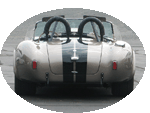 
 Main Menu
Main Menu
|
 Nevada Classics
Nevada Classics
|
 Advertise at CC
Advertise at CC
|
| S |
M |
T |
W |
T |
F |
S |
| |
|
|
|
|
|
1 |
| 2 |
3 |
4 |
5 |
6 |
7 |
8 |
| 9 |
10 |
11 |
12 |
13 |
14 |
15 |
| 16 |
17 |
18 |
19 |
20 |
21 |
22 |
| 23 |
24 |
25 |
26 |
27 |
28 |
|
|
 CC Advertisers
CC Advertisers
|
|

06-07-2009, 06:14 PM
|
 |
CC Member

|
|
|
Join Date: Aug 2003
Location: San Diego,
CA
Cobra Make, Engine: BDR #455, KC427W, TWM-FI
Posts: 727
|
|

 Not Ranked
Not Ranked
 Oil too cold. I need proof that it is bad
Oil too cold. I need proof that it is bad
OK here is the deal. My buddy has a boat and the oil is cooled via a ocean water heat exchanger which keeps the oil at 140F when it is running hard.
I keep telling him that it is running too cold and you can even see the cream (water/ oil) build up on the breather. His response is he is running synthetic and oil works just as well at low temps.
What I need is documentation or pictures which show what low oil temp does to an engine. Anybody got any ideas?
Rob |

06-07-2009, 07:07 PM
|
|
CC Member

|
|
|
Join Date: Nov 2003
Location: New Britain,
CT
Cobra Make, Engine: Size 10 Feet
Posts: 3,024
|
|

 Not Ranked
Not Ranked
Personally, I don't think running oil temps below 160F are much of a problem. The gauge might say that is the temperature in the pan but the oil passes over parts of the block that are considerably warmer. Unless you do a lot of runs that don't get the engine up to operating temperature, I don't think water in the oil will be a big deal. Change the oil at 2000 mile intervals if you're paranoid.
As far as the boat situation, they are rarely run for short periods and so water condensation in the pan should be very small. |

06-07-2009, 07:37 PM
|
 |
Half-Ass Member

|
|
|
Join Date: Jun 2005
Cobra Make, Engine: ERA #732, 428FE (447 CID), TKO600, Solid Flat Tappet Cam, Tons of Aluminum
Posts: 22,017
|
|

 Not Ranked
Not Ranked
 Are Boats kinda like Airplanes?
Are Boats kinda like Airplanes?
Shell Oil's Perspective... Yes, this is regarding aircraft, but I include it mostly for the 170 degree quote.
Quote:
Yes, low oil temperature can lead to excessive rusting and corrosion of critical engine parts. When an aircraft sits on the ramp or in a hangar, the engine heats up during the day and cools again at night. While the engine is cooling, some of the moisture in the air condenses on the engine walls and drops into the oil. This can form rust on internal engine components. The moisture can also react with by-products of combustion in the oil,forming acids which can lead to corrosion. The best way to remove this water is for the engine to boil it off during flight. Studies have shown that the temperature of your engine oil increases about 50°F as it circulates through the engine. Therefore, unless the oil temperature reaches 170°F to 180°F during flight, the engine will not boil off the water that has accumulated in the crankcase. The result: rust and corrosion. Note that an excessively high oil temperature will also cause problems. Here are some tips to help avoid oil temperature problems:
Check your oil temperature gauge for accuracy. It should read about 212°F when the sensor is placed in boiling water.
Monitor the oil temperature during flight. It should be about 180°F even in winter. If it is lower, you may need a winterization kit. Otherwise, check with your mechanic to see what is causing the excessively low oil temperature.
|
Source: http://www.shell.com/home/content/av..._a_problem?_13 |

06-07-2009, 09:31 PM
|
 |
CC Member

|
|
|
Join Date: Feb 2007
Location: Colorado Springs,
CO
Cobra Make, Engine: Backdraft, supercharged Coyote
Posts: 2,452
|
|

 Not Ranked
Not Ranked
Trying to find actual data on minimum car oil temp is very difficult. Manufcturers don't want to publish that for some reason. As best as I have been able to uncover over the years, 180* is generally considered to be minimum operating temp.
Some parts of the oil will heat the oil to higher temps than you see in the pan. The oil can see an additional 30-40* - like the bottom of the pistons. But that is for such a small period of time that it doesn't really help.
|

06-08-2009, 03:20 AM
|
 |
CC Member

|
|
|
Join Date: Feb 2006
Location: Gore. New Zealand.,
SI
Cobra Make, Engine: DIY Coupe, F/T ,MkIV.
Posts: 808
|
|

 Not Ranked
Not Ranked
I wouldnt be entirely happy with oil at 140° especially under full load, but the bigger issue is the condensation & the point that the oil wont be getting hot enough to boil that off. However you dont mention what the water/coolant running temp is, if this is also down around the 140/160 mark then none of the heat critical clearances like piston to bore will be optimum & it could lead to early damage like cracked piston skirts & poor ring sealing.
__________________
Jac Mac
|

06-08-2009, 08:52 AM
|
|
CC Member

|
|
|
Join Date: Jun 2005
Cobra Make, Engine:
Posts: 3,077
|
|

 Not Ranked
Not Ranked
The reason your buddies boat has a 140f thermostat is so the water passages do not plug with salt from salt water. If he had a 200f thermostat then the water would evaporate and the block cooling passages would plug off. True engine longevity may not be as long but most boat engines corrode out long before they wear out. Another thing to remember is a boat engine never gets a break, it never coast, sits at a light etc and most are run close to wide open throttle the majority of the time. I have mercruiser and its therostat is also 140F. Now if you go with larger more expensive engines they will have an exchanger where the engine coolant is run at 200F and the sea water cools the opposiste side of the exchanger. Needless to say you have to take apart your exchanger every couple of years to clean.
|

06-08-2009, 08:54 AM
|
|
CC Member

|
|
|
Join Date: Jun 2005
Cobra Make, Engine:
Posts: 3,077
|
|

 Not Ranked
Not Ranked
Most boat manufacturere recommend straight oil as opposed to multiviscosity if you cannot find their specific oil. Once again the engine starts and runs all day, once a week or month, so cold engine start up is not as much of a concern as a car engine which starts every day.
|

06-08-2009, 11:24 AM
|
|
CC Member

|
|
|
Join Date: Jul 2008
Location: Driftwood,
TX
Cobra Make, Engine: Contemporary Cobra, 427 side oiler
Posts: 1,850
|
|

 Not Ranked
Not Ranked
Your buddy needs to talk to the engine manufacturer. If its Mercury, they don't recommend synthetic oils. I had two Mercury Racing 800SCs in my last Scarab and they used straight 40W Mercury brand dino oil. Boats don't typically run 180-200* temps like cars. Every offshore performance boat I have owned ran around 160-165* at WOT and 175-180* at idle after hard running.
|
 Posting Rules
Posting Rules
|
You may not post new threads
You may not post replies
You may not post attachments
You may not edit your posts
HTML code is Off
|
|
|
All times are GMT -7. The time now is 02:56 PM.
Links monetized by VigLink
|


